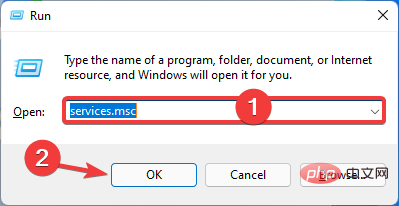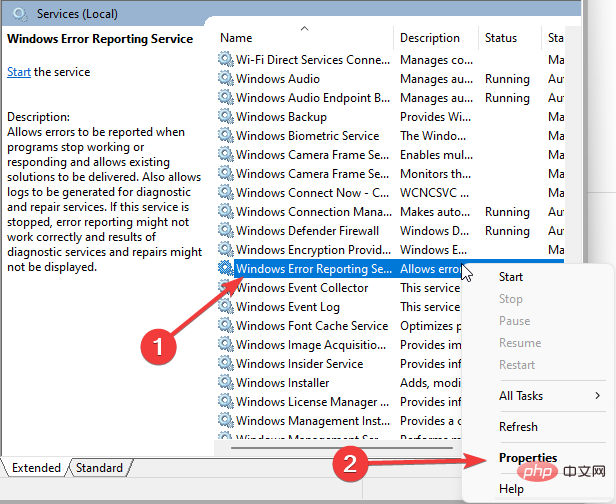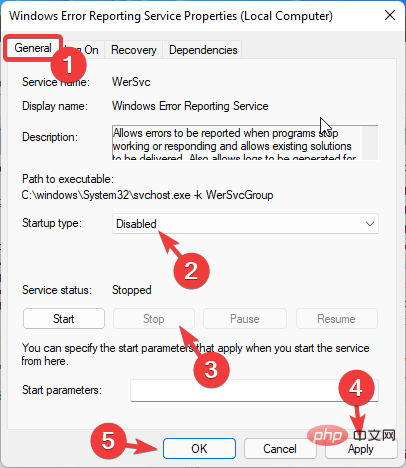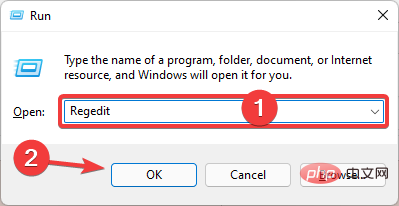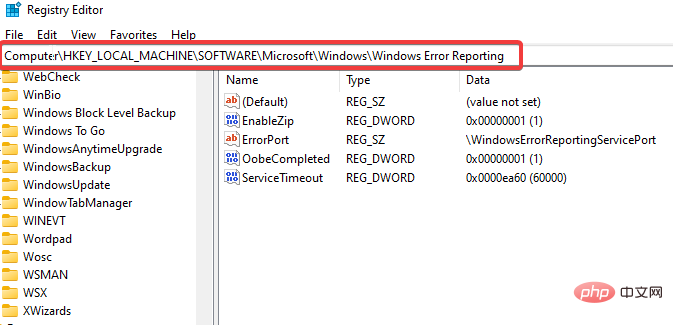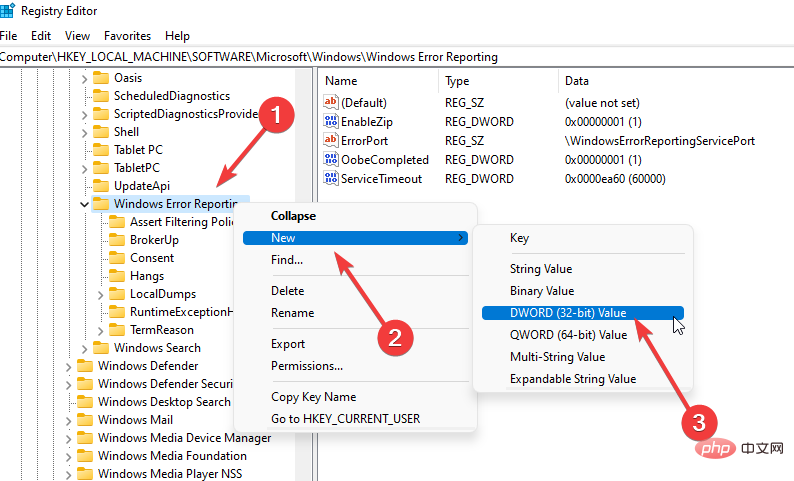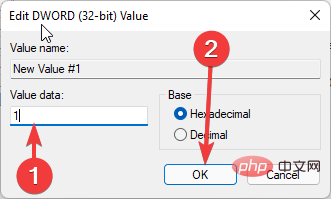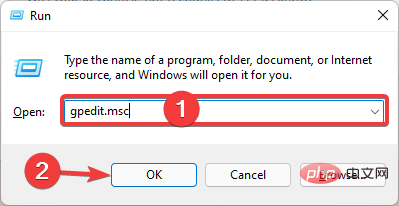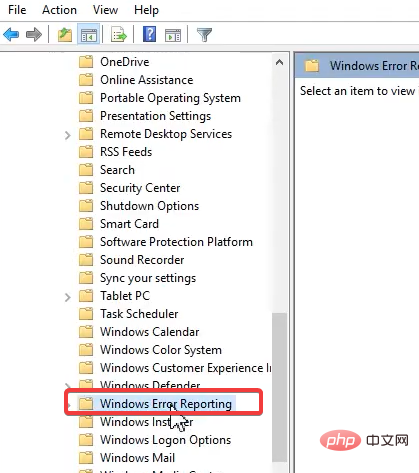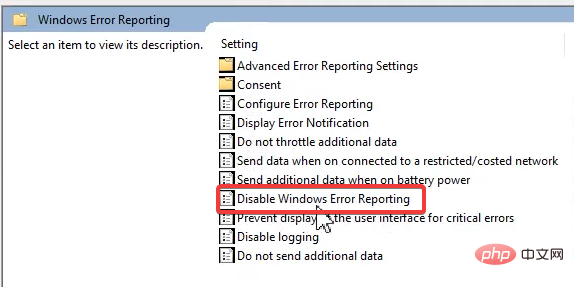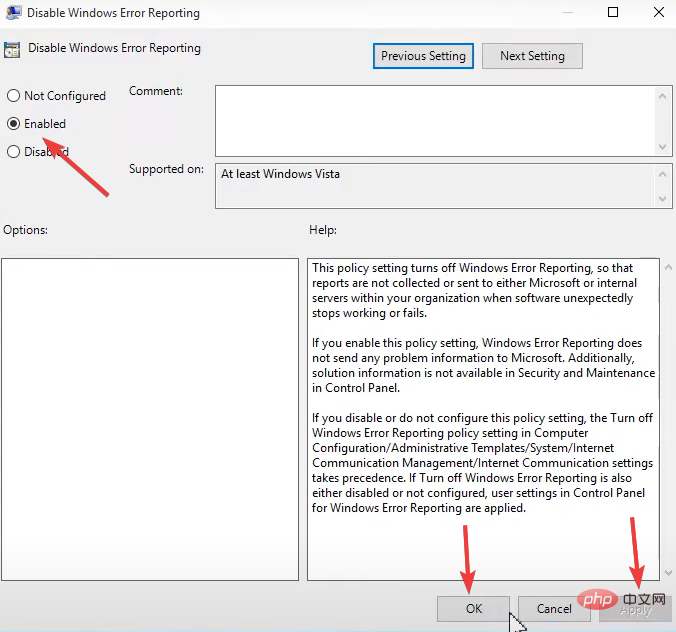How to disable the Windows Error Reporting Service on Windows 11
When an issue or crash occurs in an earlier version of Windows, you will receive a prompt asking if you want to send a bug report. This way, you can decide at any time whether you want to log the details of your system errors in the massive Microsoft database.
A lot has changed with newer Windows versions. You will no longer see a pop-up asking for your permission to report bugs, but they will still be reported.
You can learn how to enable or disable error reporting in Windows 10 to make sure you're ready to handle the task no matter what operating system you use.
This article explains what error reporting is and how to disable it in Windows 11.
What is the Microsoft Windows Error Reporting Service?
Error reporting is critical to finding software bugs and is required to fix them. Microsoft developers need to know what processes were running on the PC when the problem occurred in order to find a solution.
They also need to know which other computers have experienced the same crash and whether the problem is specific to the manufacturer.
The Windows Error Reporting (WERP) service is so powerful that even virtual machines hosted on your PC can emit errors.
The report created is very detailed and may include:
- The severity of the problem.
- Which part of the software or hardware does the problem occur?
- Logs that are important for explaining the problem.
- Information about your hardware or software.
- Possible compatibility issues.
The WERP service generates a GUID, or globally unique identifier, on your computer. This GUID is stored on your computer and sent with error reports to uniquely represent your PC.
Microsoft's WERP service provides installation repair. This tool may be triggered to run if a problem occurs during Windows installation. If you choose the recommended settings when setting up Windows 11, your PC errors will be handled automatically.
How do I check the error logs on my Windows 11 PC?
When you encounter an error or Windows glitch, you might start panicking without knowing what's causing the problem. Error logs can give a good indication of the cause and help you understand what fixes can be applied.
On Windows 11, you can use Event Viewer to view the error log. This utility displays application logs and system messages, including warning, error, and information messages.
Our tutorial on checking error logs on Windows 11 explains how to view error logs on Event Viewer.
Even if your PC seems to be running fine, Event Viewer may still show errors and warnings in the logs. Therefore, it is a good maintenance practice to pay attention to and resolve warnings before they escalate into real PC problems.
How to disable the error reporting service?
1. Through the services window
-
use the hotkey Windows R to open the Run dialog box, then type services.msc and Press the Enter or OK button.

- In the Services window, right-click Windows Error Reporting Service in the right pane and select Properties.

- Click on the General tab. From the drop-down menu in the Startup Type section, select Disable, click Stop under the Service Status section, and then click Click Apply to confirm.

- Restart your computer.
2. Use the Registry Editor
- to launch the Run dialog box again (Windows R).
- Enter regedit and click the OK button or click enter.

- Paste this path into the navigation bar:
HKEY_LOCAL_MACHINE\SOFTWARE\Microsoft\Windows\Windows Error Report
- Right click Windows Error Reporting folder, select New from the context menu, then select DWORD (32-bit).

- Name the newly created file Disabled.
-
Change the value of Disabled to 1 and click OK.

- Restart the computer.
3. Use the Group Policy Editor
- to open the "Run" dialog box again.
- Enter gpedit.msc and click the OK button or click enter.

- Navigate to Computer Configuration/Administrative Templates/Windows Components/Windows Error Reporting.

- In the right pane, double-click Disable Windows Error Reporting.

- In the Disable Windows Error Reporting window, select the Enable radio button and click Apply and Sure.

- Restart the computer.
Does disabling the Windows Error Reporting Service pose a security risk?
There are no risks associated with disabling this service, but you should exercise some restraint. This service benefits both you and Microsoft. For example, Microsoft can develop service packs and updates to handle system glitches and improve the Windows 11 user experience.
We recommend not disabling this service, but if you are low on memory, this may be a reason to disable some services.
The above is the detailed content of How to disable the Windows Error Reporting Service on Windows 11. For more information, please follow other related articles on the PHP Chinese website!

Hot AI Tools

Undresser.AI Undress
AI-powered app for creating realistic nude photos

AI Clothes Remover
Online AI tool for removing clothes from photos.

Undress AI Tool
Undress images for free

Clothoff.io
AI clothes remover

AI Hentai Generator
Generate AI Hentai for free.

Hot Article

Hot Tools

Notepad++7.3.1
Easy-to-use and free code editor

SublimeText3 Chinese version
Chinese version, very easy to use

Zend Studio 13.0.1
Powerful PHP integrated development environment

Dreamweaver CS6
Visual web development tools

SublimeText3 Mac version
God-level code editing software (SublimeText3)

Hot Topics
 1377
1377
 52
52
 How to run a JAR file on Windows 11 or 10
May 12, 2023 pm 06:34 PM
How to run a JAR file on Windows 11 or 10
May 12, 2023 pm 06:34 PM
Windows 11 is capable of running a large number of file types with or without external third-party applications. Not only does it allow you to perform numerous tasks from the comfort of your PC, but it also ensures that you can take advantage of your PC's raw capabilities. Today, we'll take a look at a complex file type—jar—and tell you how to open it on your Windows 11 or Windows 10 PC. What is a jar file? jar is an archive package format that may or may not contain an executable Java program. These archives can contain Java applications or source code, which can then be used to compile and run applications without having to write separate code for each application. You can use various methods
 How to disable driver signature enforcement in Windows 11
May 20, 2023 pm 02:17 PM
How to disable driver signature enforcement in Windows 11
May 20, 2023 pm 02:17 PM
Microsoft has built several security features into Windows to ensure your PC remains secure. One of them is driver signature enforcement in Windows 11. When this feature is enabled, it ensures that only drivers digitally signed by Microsoft can be installed on the system. This helps most of the users to a great extent as it protects them. But there is a downside to enabling driver signature enforcement. Suppose you find a driver that works for your device, but it is not signed by Microsoft, although it is completely safe. But you won't be able to install it. Therefore, you must know how to disable driver signing in Windows 11
 4 Ways to Enable or Disable Microsoft Store on Windows 11 or 10
May 14, 2023 am 10:46 AM
4 Ways to Enable or Disable Microsoft Store on Windows 11 or 10
May 14, 2023 am 10:46 AM
Here are some possible reasons why you need to disable Microsoft Store: Stop unwanted notifications. Preserves data by limiting the background processes of the Microsoft Store to improve security or privacy Addresses some issues related to the Store or the apps it installs. Restrict children, family members, or other users from downloading applications without permission. Steps to Disable or Enable Windows Store Before following this tutorial, disabling the Microsoft Store will also stop the installation of any apps that require its services. To use the store, users need to enable its service in the same way as blocking it. 1. Block WindowsStore background service Let us from restricting Microsoft Store as
 How to fix Windows 11 activation error 0xc004c060
May 17, 2023 pm 08:47 PM
How to fix Windows 11 activation error 0xc004c060
May 17, 2023 pm 08:47 PM
Why am I encountering Windows 11 activation error 0xc004c060? First make sure you are using genuine Windows and that the license key is valid. Also, check if it was obtained from an official source and if the key is suitable for the installed OS version. If there is an issue with any of these, you may encounter Windows 11 activation error 0xc004c060. So be sure to verify these and if you find everything is in order, move on to the next section. If you obtained the key through unreliable means or believe that the installed copy is a pirated version, you will need to purchase a valid key from Microsoft. In addition to this, misconfigured settings, missing
 How to fix runtime error 339 on Windows 11/10
May 13, 2023 pm 11:22 PM
How to fix runtime error 339 on Windows 11/10
May 13, 2023 pm 11:22 PM
There can be several reasons why runtime error 339 occurs when running a program. Some of them may be that some ocx or dll files are missing, damaged or the dll or ocx is not registered. This would be an annoying experience for the smooth execution of the application. Here are some of the possible error messages you may see for Runtime Error 339 Error – Runtime Error 339: Component DUZOCX32.OCX is not registered correctly or the file is missing. Error – Runtime Error 339. Component MSMASK32.ocx or one of its dependencies is not registered correctly; the file is missing or invalid. Error – Runtime Error '339': Component 'FM20.DLL' or one of its dependencies was not correctly noted
 0x80010105: How to fix this Windows update error
May 17, 2023 pm 05:44 PM
0x80010105: How to fix this Windows update error
May 17, 2023 pm 05:44 PM
Microsoft regularly releases Windows updates to improve functionality or increase the security of the operating system. You can ignore some of these updates, but it's important to always install security updates. While installing these updates, you may encounter error code; 0x80010105. An unstable connection usually causes most update errors, and once the connection is reestablished you're good to go. However, some require more technical troubleshooting, such as the 0x80010105 error, which is what we will see in this article. What causes WindowsUpdate error 0x80010105? This error may occur if your computer has not been updated in a while. Some users may have permanently disabled W for their reasons
 5 Ways to Disable Delivery Optimization Service in Windows
May 17, 2023 am 09:31 AM
5 Ways to Disable Delivery Optimization Service in Windows
May 17, 2023 am 09:31 AM
There are many reasons why you might want to disable the Delivery Optimization service on your Windows computer. However, our readers complained about not knowing the correct steps to follow. This guide discusses how to disable the Delivery Optimization service in a few steps. To learn more about services, you may want to check out our How to open services.msc guide for more information. What does Delivery Optimization Service do? Delivery Optimization Service is an HTTP downloader with cloud hosting solution. It allows Windows devices to download Windows updates, upgrades, applications and other large package files from alternative sources. Additionally, it helps reduce bandwidth consumption by allowing multiple devices in a deployment to download these packages. In addition, Windo
 How to disable display scaling for high DPI settings in Windows 11 or 10
May 22, 2023 pm 10:11 PM
How to disable display scaling for high DPI settings in Windows 11 or 10
May 22, 2023 pm 10:11 PM
The default display scaling feature on Windows 10 or later is a core component of the Windows operating system. But sometimes, this feature of certain apps can cause compatibility issues, unreadable text, blurry logos, and ultimately, app crashes. This can be a huge headache if you're dealing with 2160p or higher resolutions. There are many ways to disable the default display scaling feature on high DPI settings. We've selected the best ones and detailed step-by-step instructions for each process. How to Disable Display Scaling on High DPI Settings There is a way, all you have to do is disable high DPI scaling for a single application, and there is a way to do it for the entire Window



